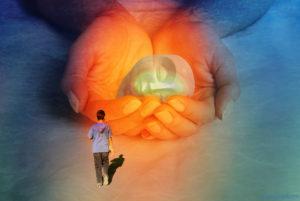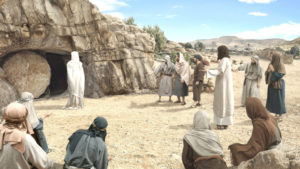At the sign of triumph Satan’s host doth flee;
On, then, Christian soldiers, on to victory!
Hell’s foundations quiver at the shout of praise;
Brothers, lift your voices, loud your anthems raise!
– Sabine Baring-Gould (1834-1924), from “Onward, Christian Soldiers” (1865)
 There is no powerful evil entity in opposition to God. It doesn’t matter whether you call him Satan, Lucifer, Beelzebub, Mephistopheles, or perhaps you just call him the plain ol’ devil. Unlike the Godhead, he does not and cannot exist in any way that matters. And this is true, even despite the fact that we can trace the notion of powerful devils back as far as there are ancient gods, and Wikipedia offers us more than seventy names for the Ultimate Bad Guy.
There is no powerful evil entity in opposition to God. It doesn’t matter whether you call him Satan, Lucifer, Beelzebub, Mephistopheles, or perhaps you just call him the plain ol’ devil. Unlike the Godhead, he does not and cannot exist in any way that matters. And this is true, even despite the fact that we can trace the notion of powerful devils back as far as there are ancient gods, and Wikipedia offers us more than seventy names for the Ultimate Bad Guy.
You can have no idea of just how much I didn’t want to talk about this! I have seen too much. Ghastly possessions and hauntings. I know the power that evil entities can have over our minds if we allow them in, so emphatically I will never use a Ouija board. I won’t watch a movie about evil, nor will I casually utter Satan’s name. So when Thomas first proposed this topic, my immediate reaction was, “Hard pass on that!” Who wants to offend the devil by announcing the fact that he cannot exist? But Thomas sensibly reminded me that for us to fear evil entities only further empowers them. He insists it is time that we trust God enough to give to evil no quarter. So, here goes!
 Those that we used to think were dead confirm that the Godhead has no powerful opposition. They also tell us that there is no hell beyond the gloomy outer darkness that Jesus talks about, and no judgment by anyone but ourselves. This testimony from those who really know the truth is abundant, and it is comforting; but it is only as we come to better understand what we might call the physics of the greater reality that we begin to see why this must be so. We will need a quickie physics course here if you want to understand why a powerful devil is as absurd an idea as is the notion of dry liquids or burning ice.
Those that we used to think were dead confirm that the Godhead has no powerful opposition. They also tell us that there is no hell beyond the gloomy outer darkness that Jesus talks about, and no judgment by anyone but ourselves. This testimony from those who really know the truth is abundant, and it is comforting; but it is only as we come to better understand what we might call the physics of the greater reality that we begin to see why this must be so. We will need a quickie physics course here if you want to understand why a powerful devil is as absurd an idea as is the notion of dry liquids or burning ice.
What we refer to as “the greater reality” is simply understood to be all that exists. It is probably not really all that exists, but it is all that we have any way to access. The simplest way to envision the greater reality is as theoretical physicists do (although they have no idea that is what they are doing!). They calculate by the motion of planets and the universe’s speed of expansion that about 27% of what exists is what they call “dark matter,” and 68% is what they call “dark energy.” It’s dark because it won’t react with photons of light, so therefore we know that it cannot be particle-based matter or its correlate energy.
Less than five percent of what exists is the traditional matter that makes up this material universe, while the rest is the non-material aspect of the greater reality. So you see, the greater reality is twenty times the size of this material universe! Yet its footprint seems to be no greater than whatever footprint the material universe occupies. It is composed of many different dimensions, just as all the hundreds of TV channels are located together in your living room and separated only by their vibratory rates. Your TV can tune to the energy of any one channel and pick up a picture; and in just the same way, the greater reality is an energy spectrum all located right where we are. Aspects of it are solid, but they are not made of particulate matter. In fact, the entire greater reality beyond this universe is both sizeless and timeless. At this moment, your mind is tuned to that body on this material level of reality. When you sleep, your mind frequently tunes to a higher vibratory rate and you travel in one of the dimensions of the non-material astral plane. When you die, your mind will tune to the Summerland levels of the afterlife portion of the astral plane, and you will be in actual heaven! Do you see how the greater reality works?
 It can be so simple because all that exists is Mind. All of our minds together, the living as well as those not now in bodies, are all together one vast, eternal Mind that is governed by the Godhead that continuously manifests what we think that we are seeing around us. Our better understanding of how good and evil work comes from our better understanding of the primary creative force that we refer to as Mind. Or we might as easily call it Consciousness. Briefly:
It can be so simple because all that exists is Mind. All of our minds together, the living as well as those not now in bodies, are all together one vast, eternal Mind that is governed by the Godhead that continuously manifests what we think that we are seeing around us. Our better understanding of how good and evil work comes from our better understanding of the primary creative force that we refer to as Mind. Or we might as easily call it Consciousness. Briefly:
- The only thing that independently exists is what we experience in a dim way as Consciousness.
- Consciousness is an energy, and as such it vibrates.
- Consciousness energy is governed by and experienced as what we call emotion.
- At its highest vibratory rate, Consciousness is perfect love; while at its lowest it is fear, hatred, rage, and other ishy emotions.
- At its highest vibration, Consciousness is infinitely powerful; while at its lowest, it has no power at all.
So perfect love is infinitely powerful, while abject fear and evil has no power. Wow, how corny that sounds! But it is beautifully true, nonetheless. In the battle between good and evil, love wins! And understanding this quick course in spiritual physics will help you to much better see how evil actually works in the world.
While there is no powerful devil to be blamed for it, there is for certain a lot of evil. There is so much evil, and it is often so insidious and so diabolical, that it is easy to see where the notion of a Big Bad Guy comes from. It is easy to see, too, how primitive people might have conceived of barbaric gods that required infant sacrifices and other ghastly gifts that would mollify them and make them like us better. Evil is indeed loose in the world! So, where does all of it come from?
The Dead Who Have Not Yet Transitioned
 We are told by those that we used to think were dead that close to 25% of those who die on earth don’t transition right away. Some die in an unplanned accident, some are afraid of hell, some are attracted to a fake version of what they expect heaven to be, and some simply get distracted at the wrong time and lose sight of the loved ones who have come to take them home. Reportedly most of these folks will be rescued in short order, but there is one class of uncompleted deaths that amounts to the worst possible form of environmental pollution. People who are executed or murdered and people who die in battle generally die at the height of some combination of fear and rage; and in that emotional state they are likely to remain. Unavoidably, they pollute the one Mind of which each of us is a part, and some become demons and actively mess with living people’s minds.
We are told by those that we used to think were dead that close to 25% of those who die on earth don’t transition right away. Some die in an unplanned accident, some are afraid of hell, some are attracted to a fake version of what they expect heaven to be, and some simply get distracted at the wrong time and lose sight of the loved ones who have come to take them home. Reportedly most of these folks will be rescued in short order, but there is one class of uncompleted deaths that amounts to the worst possible form of environmental pollution. People who are executed or murdered and people who die in battle generally die at the height of some combination of fear and rage; and in that emotional state they are likely to remain. Unavoidably, they pollute the one Mind of which each of us is a part, and some become demons and actively mess with living people’s minds.
Demons
A demon is a low-vibration being that lacks a material body. Some are not human, but most of them are apparently dead people who never transitioned; and their problem is that they must create in us and then consume human fear in order to survive at all. (I still have no idea why this is true.) During the decades when I was reading the Bible nightly, one thing that came to bother me was the claim that Jesus was casting out demons. I thought that had to be fiction! I was sure there were no demons, yet they are mentioned 18 times in the Gospel of Matthew, 17 times in Mark, and an amazing 24 times in Luke. For example, “He was met by a man from the city who was possessed with demons; and who had not put on any clothing for a long time, and was not living in a house, but in the tombs. Seeing Jesus, he cried out and fell before Him, and said in a loud voice, ‘What business do we have with each other, Jesus, Son of the Most High God? I beg You, do not torment me.’ For He had commanded the unclean spirit to come out of the man. For it had seized him many times; and he was bound with chains and shackles and kept under guard, and yet he would break his bonds and be driven by the demon into the desert. And Jesus asked him, “What is your name?” And he said, “Legion,” for many demons had entered him. … Now there was a herd of many swine feeding there on the mountain; and the demons implored Him to permit them to enter the swine. And He gave them permission. And the demons came out of the man and entered the swine; and the herd rushed down the steep bank into the lake and was drowned. When the herdsmen saw what had happened, they ran away  and reported it in the city and out in the country. The people went out to see what had happened; and they came to Jesus, and found the man from whom the demons had gone out, sitting down at the feet of Jesus, clothed and in his right mind; and they became frightened” (LK 8:27-35).
and reported it in the city and out in the country. The people went out to see what had happened; and they came to Jesus, and found the man from whom the demons had gone out, sitting down at the feet of Jesus, clothed and in his right mind; and they became frightened” (LK 8:27-35).
I now realize that indeed there are troublesome demons! Some are evil, but most are simply earthbound. And they can indeed be “cast out.” Dr. Allan L. Botkin uses induced after death communication protocols to free Vietnam War veterans and others from the spirits of possessing victims of wars, and he teaches his protocols to other therapists. Our dear friend Dr. R. Craig Hogan teaches a similar technique. And there is a lot of evidence that addicts of all kinds are addicted in part because deceased addicts have possessed their bodies and minds. I am coming to suspect that in a more enlightened age, the techniques once used by Jesus and now used by practitioners like Dr. Allan Botkin will be broadly seen as a shortcut way to heal any number of human ills.
Living People
Despite the theories of scientists who hold the mistaken notion that the mind is somehow generated by the brain, people who are now in bodies do have free will. Having the power to choose to do something negative and evil is an essential part of our eventually having the unrestricted power to do what is loving and good. And since our minds are all part of one universal Mind, those who individually choose fear, hatred, and rage can do a disproportionate amount of harm.
 So there doesn’t need to be any organized Satan for evil to be loose in the world. Demons often act together, and if you think that you are interacting with Satan, you can bring a flood of awful gremlins into your life that can be almost impossible to evict. They have very limited power, but they can mess up your life. So, how can you protect yourself from evil as you seek to grow spiritually? We’ll talk about that next week….
So there doesn’t need to be any organized Satan for evil to be loose in the world. Demons often act together, and if you think that you are interacting with Satan, you can bring a flood of awful gremlins into your life that can be almost impossible to evict. They have very limited power, but they can mess up your life. So, how can you protect yourself from evil as you seek to grow spiritually? We’ll talk about that next week….
Onward, then, ye people, join our happy throng,
Blend with ours your voices in the triumph song;
Glory, laud, and honor, unto Christ the King;
This thro’ countless ages men and angels sing.
– Sabine Baring-Gould (1834-1924), from “Onward, Christian Soldiers” (1865)































































